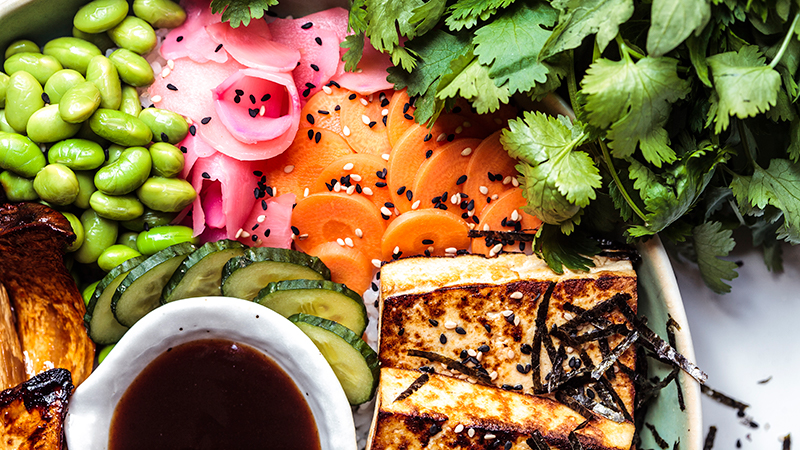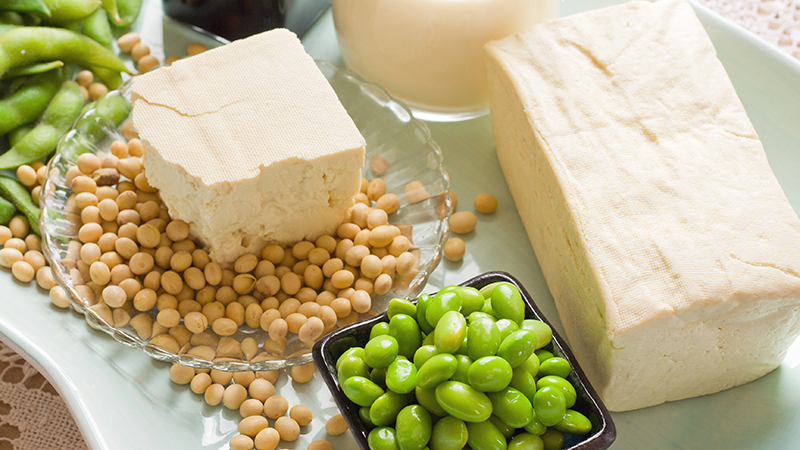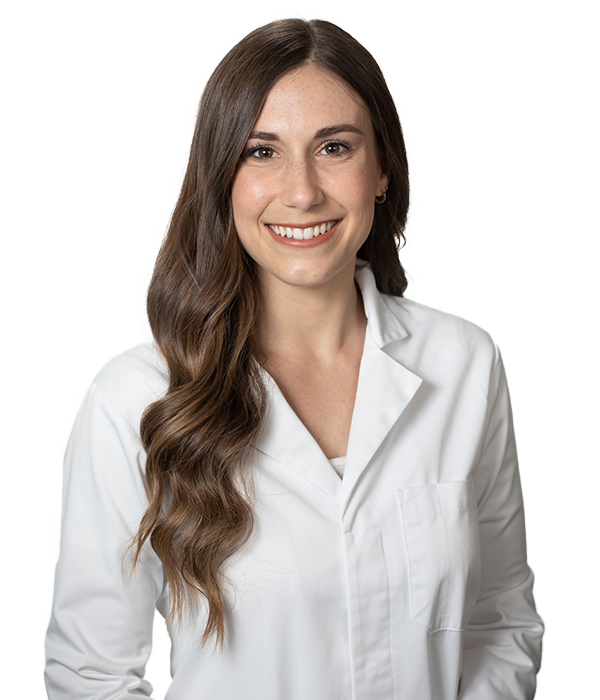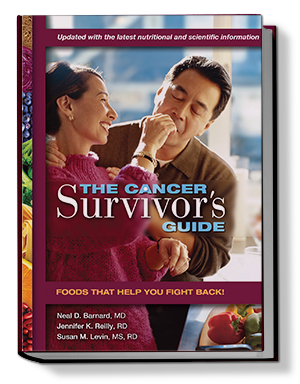Breast Cancer
Fight Breast Cancer With a Plant-Based Diet
Eating a low-fat diet rich in fruits, vegetables, grains, and beans—while avoiding meat, dairy, and fatty animal products—promotes breast health.
Protect With a Plant-Based Diet

The quality of the food we consume can impact our risk of developing breast cancer. Research has shown that consuming more healthful plant-based foods, such as whole grains, fruits, and vegetables, is associated with a lower risk of developing breast cancer.1 Fruits and vegetables have been found to be protective against developing breast cancer and dying from breast cancer.2 Researchers have suggested the antioxidants found in fruits and vegetables protect against breast cancer by reducing DNA damage in breast cells.
One study of nearly 10,000 women found that those who consume low-fat diets have a 23% lower risk for breast cancer recurrence.3 They also have a 17% lower risk of dying from the disease.
In overweight women with metastatic breast cancer, a whole food, plant-based diet can improve health markers. Research published in 2024 found that after just eight weeks on the diet, women in the intervention group had reduced fasting insulin, reduced insulin resistance, reduced total and LDL cholesterol, an improved hormonal profile, and experienced a 6.6% weight loss on average.4 While this study was not long enough to assess cancer-related outcomes, previous research has found that diets high in plant-based foods, especially fruit, vegetables, and soy, are associated with a lower risk of dying from cancer.5
The Benefits of Soy
Soy has been found to be protective against developing breast cancer, particularly when consumed during adolescence. This may be because phytoestrogens affect the developing breast tissue during puberty, resulting in a reduced risk of breast cancer later in life.6 After a diagnosis of breast cancer, women who eat more soy-based foods actually have a better chance at a long, healthy life. They are less likely to have a recurrence and less likely to die from breast cancer than women who skip soy or eat less soy.7-8 The notion that soy products are associated with increased recurrence is a myth that has been widely and mistakenly promoted. Research findings show that eating soy foods like tofu, tempeh, and soy milk seems to have a protective effect.9
The BRCA gene mutation is the most significant genetic risk factor for developing breast cancer. One study found that the protective effect of soy was stronger in women with the BRCA mutation than those without.10 Soy intake was associated with only a 27% breast cancer risk reduction in people without the BRCA mutation, but a 73% risk reduction in carriers of BRCA gene mutation.
Dairy Hazards
The research on the link between dairy and breast cancer is less clear. The Life After Cancer Epidemiology study found that, among women previously diagnosed with breast cancer, those consuming one or more servings of high-fat dairy products (e.g., cheese, ice cream, whole milk) daily had a 49% higher breast cancer mortality, compared with those consuming less than one-half serving daily, while low-fat dairy products were not associated with an increased risk.11
Research funded by the National Cancer Institute, the National Institutes of Health, and the World Cancer Research Fund, found that women who consumed 1/4 to 1/3 cup of cow’s milk per day had a 30% increased chance for breast cancer, while there was no change in risk associated with cheese or yogurt.12
Another long-term study called the China Kadoorie Biobank study followed 300,911 pre- and postmenopausal women for 11 years.13 In this population where dairy consumption is relatively lower than in a Western population, researchers found a positive association between dairy consumption and breast cancer, with a 17% increased risk for each 50 grams of dairy products consumed per day above the average intake of 37.9 grams.
Red and Processed Meat
Studies, such as the UK Women’s Cohort Study, show that red and processed meat, like hot dogs and bacon, can increase breast cancer risk.14 The Nurses’ Health Study II found that premenopausal women who ate the most red meat had a 97% higher risk of a common type of breast cancer.15 The NIH-AARP Study involving nearly 200,000 women found a 25% higher risk for breast cancer in those eating the most red meat, compared to those eating the least.16
Let’s Beat Breast Cancer
The Let’s Beat Breast Cancer campaign is an annual campaign pioneered by the Physicians Committee to show how a healthful diet and lifestyle can help reduce your breast cancer risk. This campaign centers around four steps:
- Choose Plant-Based Foods
- Exercise Regularly
- Limit Alcohol
- Maintain a Healthy Weight
Phytoestrogens get a bad rap because the word has ‘estrogen’ in it. But soy, which is high in phytoestrogens, is one of the most protective foods you can eat for breast cancer, and the younger you are when you start to eat soy regularly, the better.
Roxanne Becker, MBChB, DipIBLM, Medical Editor and Educator, Physicians Committee
Plant-Powered Prescription for Breast Cancer
- Consume at least half a cup of soy milk or tofu each day, to reduce breast cancer risk with phytoestrogens.
- Eliminate red and processed meat, as they contain cancer-causing compounds.
- Eat at least five servings of fruits and vegetables each day, as the antioxidants are powerful protection against breast cancer.
References
- Shah S, Mahamat-Saleh Y, Ait-Hadad W, et al. Long-term adherence to healthful and unhealthful plant-based diets and breast cancer risk overall and by hormone receptor and histologic subtypes among postmenopausal females. Am J Clin Nutr. 2023;117(3):467-476. doi:10.1016/j.ajcnut.2022.11.019
- Farvid MS, Barnett JB, Spence ND. Fruit and vegetable consumption and incident breast cancer: a systematic review and meta-analysis of prospective studies. Br J Cancer. 2021;125(2):284-298. doi:10.1038/s41416-021-01373-2
- Xing MY, Xu SZ, Shen P. Effect of low-fat diet on breast cancer survival: a meta-analysis. Asian Pac J Cancer Prev. 2014;15(3):1141-1144. doi:10.7314/apjcp.2014.15.3.1141
- Campbell TM, Campbell EK, Culakova E, et al. A whole-food, plant-based randomized controlled trial in metastatic breast cancer: weight, cardiometabolic, and hormonal outcomes. Breast Cancer Res Treat. 2024. doi:10.1007/s10549-024-07266-1
- Hardt L, Mahamat-Saleh Y, Aune D, Schlesinger S. Plant-based diets and cancer prognosis: a review of recent research. Curr Nutr Rep. 2022;11(4):695-716. doi:10.1007/s13668-022-00440-1
- Messina M. Impact of soy foods on the development of breast cancer and the prognosis of breast cancer patients. Forsch Komplementmed. 2016;23(2):75-80. doi:10.1159/000444735
- Nechuta SJ, Caan BJ, Chen WY, et al. Soy food intake after diagnosis of breast cancer and survival: an in-depth analysis of combined evidence from cohort studies of US and Chinese women. Am J Clin Nutr. 2012;96(1):123-132. doi:10.3945/ajcn.112.035972
- Shu XO, Zheng Y, Cai H, et al. Soy food intake and breast cancer survival. JAMA. 2009;302(22):2437-2443. doi:10.1001/jama.2009.1783
- Zhang FF, Haslam DE, Terry MB, et al. Dietary isoflavone intake and all-cause mortality in breast cancer survivors: The Breast Cancer Family Registry. Cancer. 2017;123(11):2070-2079. doi:10.1002/cncr.30615
- Ko KP, Kim SW, Ma SH, et al. Dietary intake and breast cancer among carriers and noncarriers of BRCA mutations in the Korean Hereditary Breast Cancer Study. Am J Clin Nutr. 2013;98(6):1493-1501. doi:10.3945/ajcn.112.057760
- Kroenke CH, Kwan ML, Sweeney C, Castillo A, Caan BJ. High- and low-fat dairy intake, recurrence, and mortality after breast cancer diagnosis. J Natl Cancer Inst. 2013;105(9):616-623. doi:10.1093/jnci/djt027
- Fraser GE, Jaceldo-Siegl K, Orlich M, Mashchak A, Sirirat R, Knutsen S. Dairy, soy, and risk of breast cancer: those confounded milks. Int J Epidemiol. 2020;49(5):1526–1537. doi:10.1093/ije/dyaa007
- Kakkoura MG, Du H, Guo Y, et al. Dairy consumption and risks of total and site-specific cancers in Chinese adults: an 11-year prospective study of 0.5 million people. BMC Med. 20226;20(1):134. doi: 10.1186/s12916-022-02330-3
- Taylor EF, Burley VJ, Greenwood DC, Cade JE. Meat consumption and risk of breast cancer in the UK Women's Cohort Study [published correction appears in Br J Cancer. 2007;96(11):1780]. Br J Cancer. 2007;96(7):1139-1146. doi:10.1038/sj.bjc.6603689
- Cho E, Chen WY, Hunter DJ, et al. Red meat intake and risk of breast cancer among premenopausal women. Arch Intern Med. 2006;166(20):2253-2259. doi:10.1001/archinte.166.20.2253
- Inoue-Choi M, Sinha R, Gierach GL, Ward MH. Red and processed meat, nitrite, and heme iron intakes and postmenopausal breast cancer risk in the NIH-AARP Diet and Health Study. Int J Cancer. 2016;138(7):1609-1618. doi:10.1002/ijc.29901










